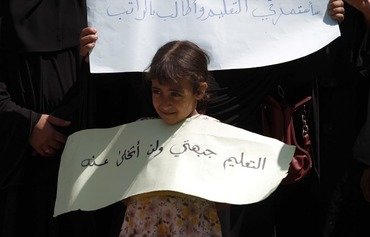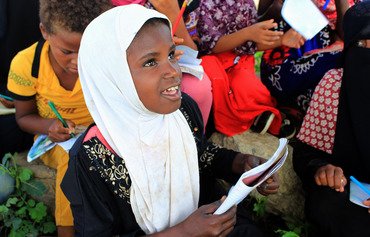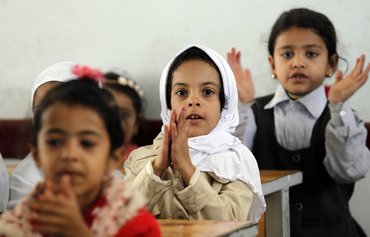Millions of Yemeni children might not go to school this year as violence rages and the teachers' salary crisis remains unresolved, according to the UN Children's Fund (UNICEF).
"More than two and a half years of renewed conflict in Yemen have once again put the education of 4.5 million children on the line, adding to the long list of bitter hardships that children have endured," Geert Cappelaere, UNICEF’s Regional Director for the Middle East and North Africa, said on Wednesday (October 18th).
An estimated two million Yemeni children are out of school, 1,600 schools have been partially or totally destroyed, and 170 schools have been used for military purposes or as shelter for displaced families, he said.
More than 166,000 teachers have not received their salaries in nearly a year, or close to 75% of teachers in Yemen, he said, adding that the violence has forced one in 10 schools across the country to close.
"The beginning of the school year was postponed several times from its usual September start, and textbooks and other school materials are in severely short supply," Cappelaere said.
Schools in the capital Sanaa and across northern Yemen provinces controlled by the Houthis (Ansarallah) were forced to delay the start of the school year by two weeks, after the Houthis failed to pay teachers their salaries.
In government-held parts of Yemen, however, most schools this year opened as scheduled on October 1st.
Teachers cannot afford transportation cost
Aesh Abu Luhum, secretary-general of the Educational Professions Union branch in Sanaa, said the union "has partially suspended the strike until the end of October to give Sanaa authorities the chance to pay salaries".
In case salaries are not paid, the union will renew its call for the strike, which may close schools again, he told Al-Mashareq.
"The school year in Sanaa began on October 15th, but attendance rate in the first week was only 40%," said Mohammed al-Fadhli, director-general of the Education Office in Sanaa administrative district.
Teachers cannot afford to feed their families or the public transportation fare to go to school, he told Al-Mashareq.
"They are fed up with promises, and failure to pay salaries may lead to the closure of schools again," he said.
Abdullah Mohammed, assistant principal of a secondary school in Sanaa, told Al-Mashareq that teachers reported to schools only as a means to follow up on the salary crisis.
"Students attending classes are not receiving any new lessons as teachers are only reviewing last year's curriculum," he said, adding that they are waiting for their salaries to be paid in order to begin teaching.
"The salary crisis has pushed teachers to extreme measures just to survive," UNICEF said on Wednesday.
Hassan Ghaleb, a teacher for the past 20 years and the sole breadwinner for his family of four, was evicted from his home with his children.
He had to sell what was left of his furniture just to feed them and treat his sick sister.
"How can I reach school if I have no money for transport? How can I teach if I myself am in need?" he said.
"More than 166,000 teachers from across Yemen ask the very same question, every day," the statement said.

![Yemeni students attend a class on the first day of the new school year in the Sanaa, on October 15th. Some 75% of Yemen's teachers have not received their salaries in a year, according to UNICEF. [Mohammed Huwais/AFP]](/cnmi_am/images/2017/10/19/10073-Yemen-Sanaa-school-600_384.jpg)







It's time young graduates went to schools.
Reply1 Comment(s)